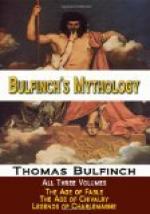When the king and his nobles had heard the song, they wondered much, for they had never heard the like from a boy so young as he. And when the king knew that he was the bard of Elphin he bade Heinin, his first and wisest bard, to answer Taliesin, and to strive with him. But when he came he could do no other than play “Blerwm!” on his lips; and when he sent for the others of the four and twenty bards, they all did likewise, and could do no other. And Maelgan asked the boy Taliesin what was his errand, and he answered him in song:
“Elphin, the son of
Gwyddno,
Is in the land of Artro,
Secured by thirteen locks,
For praising his instructor.
Therefore I, Taliesin,
Chief of the bards of the
west,
Will loosen Elphin
Out of a golden fetter.”
Then he sang to them a riddle:
“Discover thou what
is
The strong creature
from before the flood,
Without flesh, without
bone,
Without vein, without
blood,
Without head, without
feet;
It will neither be older
nor younger
Than at the beginning.
Behold how the sea whitens
When first it comes,
When it comes from the south,
When it strikes on coasts
It is in the field, it is
in the wood,
But the eye cannot perceive
it.
One Being has prepared it,
By a tremendous blast,
To wreak vengeance
On Maelgan Gwynedd.”
While he was thus singing his verse, there arose a mighty storm of wind, so that the king and all his nobles thought that the castle would fall upon their heads. And the king caused them to fetch Elphin in haste from his dungeon, and placed him before Taliesin. And it is said that immediately he sung a verse, so that the chains opened from about his feet.
After that Taliesin brought Elphin’s wife before them, and showed that she had not one finger wanting. And in this manner did he set his master free from prison, and protect the innocence of his mistress, and silence the bards so that not one of them dared to say a word. Right glad was Elphin, right glad was Taliesin.
HERO MYTHS OF THE BRITISH RACE
BEOWULF
Notable among the names of heroes of the British race is that of Beowulf, which appeals to all English-speaking people in a very special way, since he is the one hero in whose story we may see the ideals of our English forefathers before they left their Continental home to cross to the islands of Britain.
Although this hero had distinguished himself by numerous feats of strength during his boyhood and early youth, it was as the deliverer of Hrothgar, king of Denmark, from the monster Grendel that he first gained wide renown. Grendel was half monster and half man, and had his abode in the fen-fastnesses in the vicinity of Hrothgar’s residence. Night after night he would steal into the king’s great palace called Heorot and slay sometimes as many as thirty at one time of the knights sleeping there.




